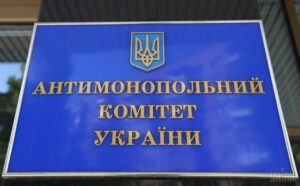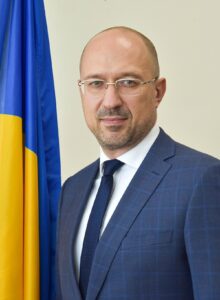
The Antimonopoly Committee of Ukraine (AMCU) on Tuesday fined a total of UAH 283.62 million a group of companies (Interstarch Ukraine LLC, PrJSC Dniprovsky starch-molasses plant, PrJSC Intercorn) related to the Roshen confectionery corporation, the beneficial owner of Oleksiy Poroshenko (son of the fifth President of Ukraine Petro Poroshenko).
“The fine was imposed for two violations of the legislation on the protection of economic competition through abuse of monopoly position in the national market for the primary sale of corn syrup and glucose syrups,” the committee said in a press release.
The committee claimed that the specified group unreasonably increased prices for molasses and syrups in April-June 2018, February-March 2019 and October 2020, and also set different conditions for equivalent agreements with buyers of this product during 2018-2020 without justified reasons.
During the investigation, which lasted a year and a half, the committee established that in 2018-2020 the group was the only producer of molasses in Ukraine and the largest and most powerful market participant with shares of 65.49% (in 2018), 93.86% (in 2019) and 79.75% (in 2020), with importers being the only competitors.
It was also found that the group is the only producer of corn starch in Ukraine with shares of 74.26% (in 2018) and 96.79% (in 2019).
“By analyzing the price behavior of the group, it was found that during 2018-2020, the price for the molasses and syrup increased and decreased by it haphazardly. The group carried out price exemptions for certain business entities (confectionery factories),” the committee said.
In particular, according to the committee, one of the buyers of molasses was offered low prices in an attempt to prevent the transfer to a competitor (importer) – Amylco LLC (Rostov region of the Russian Federation), as well as to prevent other buyers of molasses, which capacities located in the eastern part of Ukraine.
“At the same time, the committee established that at present, the Ukrkondprom association has begun to receive initiatives to impose a ban on the import of molasses from the Russian Federation. And on January 8, 2019, by government resolution No. 1154, the ban was introduced,” the committee said.
In addition, the committee revealed that the group applied various conditions in contracts for the supply of molasses with buyers without objectively justified reasons: the procedure for ordering and agreeing on the supply of goods, terms of payment for goods, sanctions, etc.
According to the committee, the group’s participation in vertical integration – from growing corn to producing confectionery products – could give Roshen a significant competitive advantage by purchasing molasses at lower prices than other confectioners.
As a result, the committee fined UAH 210.19 million Interstarch Ukraine LLC, UAH 47.46 million PrJSC Dniprovsky starch-molasses plant and UAH 25.98 million PrJSC Intercorn, and also ordered them to terminate violations.

After eight years have passed since the Euromaidan events, more than a third of Ukrainians would not support either supporters or opponents of protest actions today – this is 34.8%.
According to a poll conducted by the Social Monitoring Center, today 22.1% of Ukrainian citizens surveyed remain Maidan supporters, 19.2% consider themselves Maidan supporters, but with certain conditions (or under certain circumstances).
Some 8.4% of the respondents identified themselves as opponents of the Maidan and supporters of Antimaidan, and 6.8% consider themselves to be opponents of the Maidan, however, with certain conditions (or under certain circumstances).
Some 8.8% of respondents found it difficult to answer the question of sociologists.
Some 40.8% of respondents in the West of Ukraine called themselves unequivocal supporters of the Maidan, in the center – 29.4%, in the east – 7.8%, in Donbas – 5.3%, in the south of the country – 10.5%, in the city of Kyiv – 25.7%.
Some 0.7% of respondents in the West of Ukraine, 4% in the center, 17.4% in the east, 11% in Donbas, 15.1% in the south and 7.2% in Kyiv consider themselves to be unequivocal opponents of the Maidan – supporters of Antimaidan.
The poll was conducted from November 28 to December 10 using a face-to-face interview method. Some 10,000 respondents were interviewed. The standard deviation is 0.6 – 1%.

Prime Minister Denys Shmyhal has said that Ukraine expects to further develop cooperation with Japan in the spheres of economy, IT and culture, the press service of the government reported.
“I am sure that Japan, as one of the world’s largest investors, can also become one of the leaders in foreign direct investment in the Ukrainian economy,” Shmyhal said following a meeting with Japanese Ambassador to Ukraine Kuninori Matsuda.
According to the prime minister, the conclusion of a new intergovernmental convention on the avoidance of double taxation can contribute to attracting investments.
“The Prime Minister stressed the importance of effective implementation of joint projects, in particular, the reconstruction of the Bortnychi wastewater treatment plant, which was also noted by the Japanese Ambassador to Ukraine Kuninori Matsuda,” the press service said.

The U.S. international radio company “The Voice of America” (VOA) has appointed journalist Myroslava Gongadze as Eastern Europe Chief, due to which she will move to Kyiv in 2022, the Voice of America press service said.
As explained in the broadcaster, as a Russian troop buildup intensifies along the Ukrainian border and in Russian-occupied Crimea, Gongadze will be covering for a global audience the Kremlin’s aggressive posture in Eastern Europe as well as the impact of Russia’s and China’s influence throughout the region.
Voice of America expects in this new role, she will lead “expanded coverage of a region threatened by hybrid war and disinformation,” the broadcaster said.
Thus, Gongadze, who has been working for the Voice of America in the United States since 2004, will move to Kyiv in 2022.
In turn, Gongadze said she is honored to build on my seventeen-year career at Voice of America in my new role as Eastern Europe Chief.

The supervisory board of the pharmaceutical company Farmak (Kyiv) has re-elected Volodymyr Kostiuk as Executive Director.
According to the company’s press service, the relevant decision was made on December 17.
As reported, JSC Farmak (Kyiv) over 2020 received net profit of about UAH 1.138 billion, which is almost 7.8% more than in 2019 (UAH 1.056 billion). Over 2019, Farmak received net profit of UAH 1.056 billion, which almost coincided with the figure for 2018 – UAH 1.05 billion; and over 2018, it increased its net profit by 25.16%.
Farmak is the leader in the pharmaceutical market with a 5.9% share in monetary terms. The company manufactures medicines in all fourteen therapeutic groups. The main directions are anti-cold, endocrine, gastroenterological, cardiovascular, and neurological portfolios. Every year Farmak introduces to the market about 20 new complex-component modern drugs, about 100 drugs are currently in development.
According to the State Register, the ultimate beneficial owner of Farmak is head of the supervisory board, Filya Zhebrovska, who owns 80% of the company’s shares.